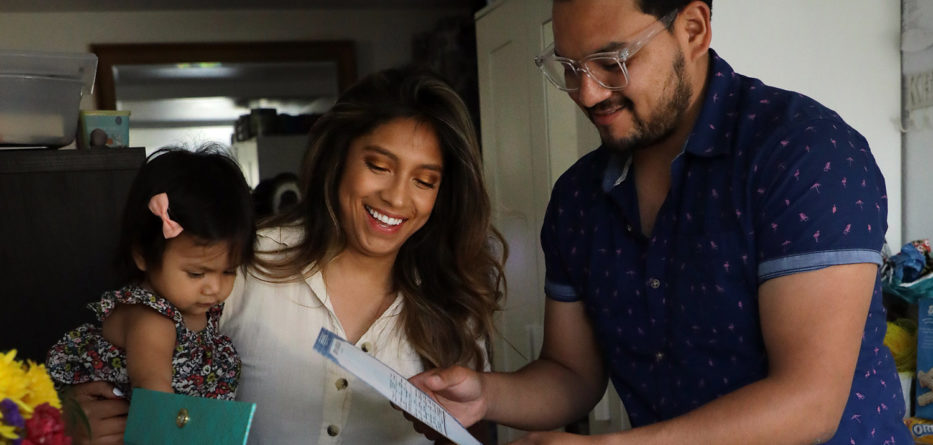Julie Hernandez
Mosaic Journalism Workshop
When Cristina and Jerry Alarcon won temporary protection from deportation, the spirits of the undocumented couple soared. Then came President Donald Trump.
Today, they keep a portfolio stuffed with personal documents in a drawer, ready to grab quickly if and when they are arrested and deported.
“Our stress is not going to change anything as far as what Donald Trump or the Congress wants to do,” Jerry Alarcon, 28, said in English as he sat on the steps of his front house on a scorching hot day in San Jose.
Their gold-and-teal plastic portfolio had all the important documents for themselves and their kids, such as passports and Social Security numbers and the children’s U.S. birth certificates.
The married couple is protected from deportation by the Deferred Action for Child Arrivals program, or DACA, established by former President Barack Obama in August 2012. Obama wanted to shield undocumented immigrants who arrived at a young age, arguing that innocent children should not be punished for decisions made by their parents. Jerry Alarcon was 9 when he arrived from El Salvador. Cristina Alarcon was 2 when she came from Mexico.
Seven years after DACA began, the Alarcons, like many of about 799,000 DACA recipients, have become DACA parents with U.S.- born children.
The future of many people’s legal status is in question because of changing politics. Trump in 2017 promised to end DACA but so far nothing has been officially set. He’s made a plea to the U.S. Supreme Court about his authority to end the program, but it might take until June 2020 for the court to decide.
Under Trump, these DACA parents now find themselves facing tough questions: If they’re deported, what should they do with their children? Return to their homelands and raise their kids in what for them will be a foreign land? Or leave the children here to live with relatives and rarely see them?
The Alarcons admit they are somewhat scared that at any moment the law will change and they’ll be gone, leaving their two children, ages 4 and 1, with relatives here. However, they’ve decided to leave on their own if Trump is re-elected.
“We feel like we could survive anywhere else,” Cristina Alarcon said in perfect, unaccented English. “We’re busting our asses here to live life, we’re going to bust our asses in any other country to live life whether it’s in Mexico or El Salvador.”
Living day by day, the Alarcons are focused on working and giving their children the best life and education they can possibly have in California. But if they had to flee, the Alarcons think the kids are young enough to adapt in Mexico.
President Trump has outlined a new immigration policy that would base immigration to the United States based on merit and skill, not on family reunification. Current undocumented immigrants would still be subject to deportation.
In a tweet this week, Trump said immigration enforcement agents will begin deporting large numbers of undocumented people. “They will be removed as fast as they come in.”
Merle Kahn, an immigration attorney in San Jose, often advises undocumented clients on arranging guardianship of their kids, setting plans for their properties and more legal issues.
“What I am seeing is that the Trump administration is not necessarily deporting more people, but they are terrifying them,” Kahn said. “They are threatening mass detentions. They are not giving people enough time to present their cases in immigration court.”
Data from the federal Immigration and Customs Enforcement, or ICE, show that roughly a half-million U.S citizen children have at least one parent possibly subject to deportation.
Another DACA couple who must deal with the question of leaving or taking their U.S.-born children with them are Pablo Vasquez and his wife.
Coming from Jalisco, Mexico, the couple lives in Gilroy with their three young children. Vasquez credits DACA for allowing him to get a job as an air-conditioning mechanic, obtain health benefits and buy a house.
“DACA 100% changed my life,” he said in Spanish.
Vasquez admitted he’s not prepared for deportation. His parents here do not have immigration papers, so leaving the children with them isn’t an option for him. He says he might sell his house in order to have something to live off of in Mexico and would take his American-born kids with him.
“I wouldn’t be able to leave them with other people,” Vasquez said. “My heart would break.”






